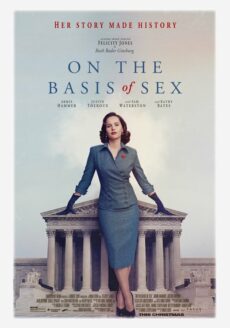Movies to Queue During the Supreme Court Ruckus
Educational entertainment for those who need a break from this news cycle
The debate over Supreme Court nominee Amy Coney Barrett’s Senate confirmation is yet another flashpoint in an uncivil and disruptive presidential election. For those interested in learning more about the Supreme Court of the United States (SCOTUS), or who simply want to be entertained during these trying times, try teeing up these movies for a weekend marathon.
The first movie is a rare look at one of the most controversial and private justices currently serving on the bench, Associate Justice Clarence Thomas. Two others—one narrative and one documentary—provide insight into the life, times, and career of Ruth Bader Ginsburg. Ginsburg was one of very few justices who achieved bona fide celebrity status during their lifetimes. The fourth movie spotlights the eminent domain case that sparked nationwide protests and pro-property rights reform in 40 states.
Created Equal (2020)
 Created Equal: Clarence Thomas in His Own Words is a rare film. Hollywood and independent filmmakers are a notoriously liberal bunch. They tend to be captivated by the ideals of the liberal left more than the earnest stories of those they perceive as being on the right. This documentary provides a modest, but important, alternative to this “monoculture” promoted by the American entertainment industry.
Created Equal: Clarence Thomas in His Own Words is a rare film. Hollywood and independent filmmakers are a notoriously liberal bunch. They tend to be captivated by the ideals of the liberal left more than the earnest stories of those they perceive as being on the right. This documentary provides a modest, but important, alternative to this “monoculture” promoted by the American entertainment industry.
As I write in my more complete review on this blog:
Created Equal concretely establishes the arc of Thomas’s character throughout his career, and his sense of ethics and self-worth are evident. The decisions he made, and opportunities he accepted, were grounded in his professional and personal transitions. Audiences should leave the movie with no doubt about Thomas’s authenticity, the principled root of his jurisprudence, or the way he approaches public service.
The producer/director duo of Gina Cappo Pack and Micheal Pack smartly stitch together a story of a heroic upbringing that inevitably leads to Thomas’s emergence as a principled jurist. Notably, his time as a judge on the U.S. Appeals Court of the District of Columbia dovetailed with the service of Ruth Bader Ginsburg.
The injustice surrounding Thomas’s controversial nomination is an important plot point that helps understand his quiet temperament while serving on the nation’s highest court. By focusing on his own words, and those that know him intimately, the public gets a glimpse at the longest service member of the Court (28 years).
On the Basis of Sex (2018)
 On the Basis is Sex is a narrative film that honors the trials, tribulations, and ultimate vindication of Ruth Bader Ginsburg. (My more complete review can be found here.)
On the Basis is Sex is a narrative film that honors the trials, tribulations, and ultimate vindication of Ruth Bader Ginsburg. (My more complete review can be found here.)
On the Basis of Sex covers Ginsburg’s early career, beginning as one of just nine female law students at Harvard in the 1950s and through to her success as the attorney responsible for elevating women to equal status under the law in 1970. Felicity Jones plays the focused and highly analytical Ginsburg while Armie Hammer plays her equally brilliant tax attorney husband Martin Ginsburg.
The movie does a great job of showing the complex relationship, attraction, and love between the RBG and her husband, Martin. Their respect and support for each other was genuine, and director Mimi Leder deserves credit for making this a centerpiece of the dramatic arc. Ruth Ginsburg is thwarted at every turn as she attempts to establish herself as a practicing attorney, and this personal support becomes crucial to her ability to forge ahead. In fact, the mutual respect between the Ginsburgs and the way they co-parented their children is the real-world allegory that mirrors her professional drive for achieving justice in the legal system.
Anchored by strong performances, On the Basis of Sex will leave many wondering how difficult it is to make common sense changes to law.
RBG (2018)
For anyone wondering how a Supreme Court justice achieved celebrity status, look no further than RBG. This award-winning documentary is a celebration of Ruth Bader Ginsburg’s life and legal career. While the movie doesn’t pack the emotional punch of a narrative film, it effectively chronicles Ginsburg’s struggles against the odds and sex discrimination. Her legal prowess, sharp mind, and success in the courtroom earned nominations to the U.S. Court of Appeals (in 1980) and U.S. Supreme Court (in 1993).
Of particular interest is conscious cultivation of her status as a pop culture icon. This effort was driven by her fans, who even coined the catch phrase “Notorious RBG.” While Ginsburg wields a sharp pen in her legal opinions, she was much more self-effacing in person. This humility and singular focus on her legal work is well told in the film.
In fact, Ginsburg makes a textbook case for how to manage a legal career steadily and without fanfare. Her reputation was so significant that she earned near-unanimous bipartisan support (94-6) for her nomination to the court by President Clinton. She was 60 years old at the time of her confirmation to SCOTUS after serving thirteen years on the U.S. Court of Appeals.
Regardless of where one stands on Ginsburg’s legal decisions—and libertarians and conservatives have much to criticize—RBG is a reminder that sharp minds, commitments to civility, and serious attention to the law are more than lip service to those who make it to the highest court in the land.
Little Pink House (2017)
 Finally, cap off your Supreme Court movie marathon with Little Pink House. This narrative film centers on what may be the most influential legal decision in recent memory: Kelo vs. City of New London. (My full review can be found here.) While the film does not focus on a Supreme Court justice, the court’s notorious decision in favor of the city and against homeowner Susette Kelo ignited reform efforts in forty states.
Finally, cap off your Supreme Court movie marathon with Little Pink House. This narrative film centers on what may be the most influential legal decision in recent memory: Kelo vs. City of New London. (My full review can be found here.) While the film does not focus on a Supreme Court justice, the court’s notorious decision in favor of the city and against homeowner Susette Kelo ignited reform efforts in forty states.
This narrative film directed and written by Courtney Moorehead Balaker features two-time Academy Award nominee Catherine Keener and is a faithful adaptation of the real-world events. Susette Kelo refused to sell her home to the City of New London despite bullying, cronyism, and legal intimidation by the city’s “private” development corporation. The movie keeps the focus on the human consequences of the law and its application, giving Keener plenty of room to anchor the film with an emotional heartfelt performance.
Ironically, some critics thought the film presented the city’s case too simplistically. Yet, as I discuss in my longer review, the film’s plot and essentials mirror the actual case as well as the attitudes of city officials. Ultimately, this movie is a story of how far property rights have eroded, aided and abetted by SCOTUS.
This piece was originally published on The Beacon under the title, Supreme Court Ruckus Got You Down? Queue Up These Movies
